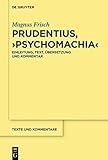Prudentius, ›Psychomachia‹ : Einleitung, Text, Übersetzung und Kommentar / Magnus Frisch.
Material type: TextSeries: Texte und Kommentare : Eine altertumswissenschaftliche Reihe ; 62Publisher: Berlin ; Boston : De Gruyter, [2020]Copyright date: ©2020Description: 1 online resource (X, 519 p.)Content type:
TextSeries: Texte und Kommentare : Eine altertumswissenschaftliche Reihe ; 62Publisher: Berlin ; Boston : De Gruyter, [2020]Copyright date: ©2020Description: 1 online resource (X, 519 p.)Content type: - 9783110628432
- 9783110630831
- online - DeGruyter
- Issued also in print.
| Item type | Current library | Call number | URL | Status | Notes | Barcode | |
|---|---|---|---|---|---|---|---|
 eBook
eBook
|
Biblioteca "Angelicum" Pont. Univ. S.Tommaso d'Aquino Nuvola online | online - DeGruyter (Browse shelf(Opens below)) | Online access | Not for loan (Accesso limitato) | Accesso per gli utenti autorizzati / Access for authorized users | (dgr)9783110630831 |
Frontmatter -- Inhaltsverzeichnis -- Tabellenverzeichnis -- Vorwort -- I. Einleitung -- 1. Zu diesem Kommentar -- 2. Aurelius Prudentius Clemens -- 3. Psychomachia -- 4. Textüberlieferung -- II. Text und Übersetzung -- III. Kommentar -- Praefatio -- Anrufung Christi (vv. 1–20) -- Fides vs. Cultura veterum deorum (vv. 21–39) -- Pudicitia vs. Sodomita Libido (vv. 40–108) -- Patientia vs. Ira (vv. 109–177) -- Superbia vs. Mens humilis & Spes (vv. 178–309) -- Luxuria vs. Sobrietas (vv. 310–453) -- Avaritia vs. Ratio & Operatio (vv. 454–628) -- Triumphzug / Discordia vs. Concordia & Fides (vv. 629–725) -- Siegesrede (vv. 726–822) -- Tempelbau (vv. 823–887) -- Dankgebet (vv. 888–915) -- IV. Anhang -- Bibliographie -- Stellenverzeichnis -- Namens- und Ortsverzeichnis
restricted access online access with authorization star
http://purl.org/coar/access_right/c_16ec
Die Psychomachia des Prudentius stellt das erste vollkommen allegorische Epos des Abendlandes dar. Es ist insbesondere in der Kunst und Literatur des Mittelalters vielfältig rezipiert worden. Magnus Frisch legt nun erstmals einen Gesamtkommentar zu diesem Werk aus der Spätantike vor, der lange ein Desiderat der Forschung war. Er berücksichtigt die Erkenntnisse der philologischen, theologischen und mediävistischen Forschung der letzten Jahrzehnte.
Prudentius’ Psychomachia is the first fully allegorical epic in the Western tradition. It was an especially important reference for the art and literature of the middle ages. As the first commentary on this work from late antiquity, Magnus Frisch’s book is an important contribution to the field. The commentary also takes into account relevant recent research in the areas of philology, theology, and medieval studies.
Issued also in print.
Mode of access: Internet via World Wide Web.
In German.
Description based on online resource; title from PDF title page (publisher's Web site, viewed 28. Feb 2023)


